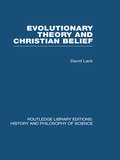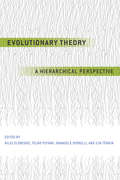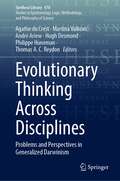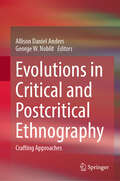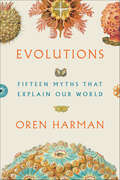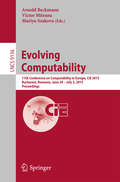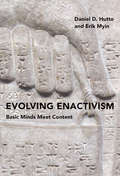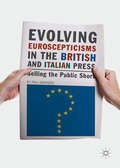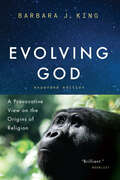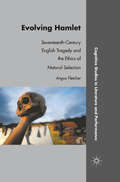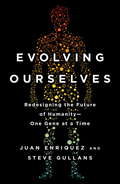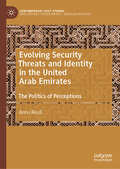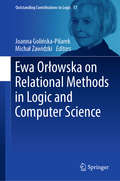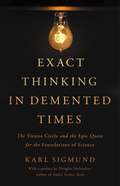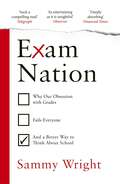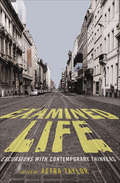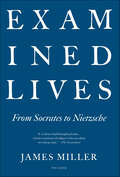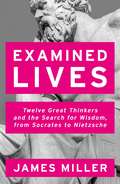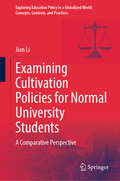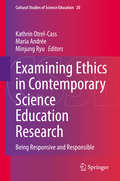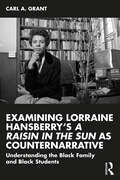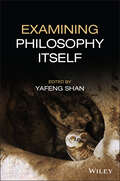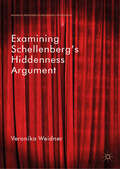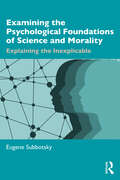- Table View
- List View
Evolutionary Theory and Christian Belief: The Unresolved Conflict (Routledge Library Editions: History & Philosophy of Science)
by David LackOriginally published in 1957. This book is concerned with the conflict between "Darwinism" as the Victorians called it, and Christianity, a conflict here re-stated in modern terms because it so vitally affects our understanding of human nature and human values today. The opening chapter describes the historical background. There is a short account of evolution and the argument over Genesis. The importance of natural selection is stressed, and rival theories as to the means of animal evolution are criticised. Discussions follow on whether the course of evolution has been random or determined, on the argument from design, death in nature, the biologist’s methods and the difficulties in evolutionary ethics.
Evolutionary Theory: A Hierarchical Perspective
by Telmo Pievani Emanuele Serrelli Niles Eldredge, Telmo Pievani, Emanuele Serrelli, and Ilya Tëmkin Ilya TëmkinThe natural world is infinitely complex and hierarchically structured, with smaller units forming the components of progressively larger systems: molecules make up cells, cells comprise tissues and organs that are, in turn, parts of individual organisms, which are united into populations and integrated into yet more encompassing ecosystems. In the face of such awe-inspiring complexity, there is a need for a comprehensive, non-reductionist evolutionary theory. Having emerged at the crossroads of paleobiology, genetics, and developmental biology, the hierarchical approach to evolution provides a unifying perspective on the natural world and offers an operational framework for scientists seeking to understand the way complex biological systems work and evolve. Coedited by one of the founders of hierarchy theory and featuring a diverse and renowned group of contributors, this volume provides an integrated, comprehensive, cutting-edge introduction to the hierarchy theory of evolution. From sweeping historical reviews to philosophical pieces, theoretical essays, and strictly empirical chapters, it reveals hierarchy theory as a vibrant field of scientific enterprise that holds promise for unification across the life sciences and offers new venues of empirical and theoretical research. Stretching from molecules to the biosphere, hierarchy theory aims to provide an all-encompassing understanding of evolution and—with this first collection devoted entirely to the concept—will help make transparent the fundamental patterns that propel living systems.
Evolutionary Thinking Across Disciplines: Problems and Perspectives in Generalized Darwinism (Synthese Library #478)
by Philippe Huneman Thomas A. C. Reydon Hugh Desmond Agathe Du Crest Martina Valković André AriewThis volume aims to clarify the epistemic potential of applying evolutionary thinking outside biology, and provides a survey of the current state of the art in research on relevant topics in the life sciences, the philosophy of science, and the various areas of evolutionary research outside the life sciences. By bringing together chapters by evolutionary biologists, systematic biologists, philosophers of biology, philosophers of social science, complex systems modelers, psychologists, anthropologists, economists, linguists, historians, and educators, the volume examines evolutionary thinking within and outside the life sciences from a multidisciplinary perspective. While the chapters written by biologists and philosophers of science address theoretical aspects of the guiding questions and aims of the volume, the chapters written by researchers from the other areas approach them from the perspective of applying evolutionary thinking to non-biological phenomena. Taken together, the chapters in this volume do not only show how evolutionary thinking can be fruitfully applied in various areas of investigation, but also highlight numerous open problems, unanswered questions, and issues on which more clarity is needed. As such, the volume can serve as a starting point for future research on the application of evolutionary thinking across disciplines.
Evolutions in Critical and Postcritical Ethnography: Crafting Approaches
by George W. Noblit Allison Daniel AndersMoving beyond traditional critical ethnography, postcritical ethnographies accept as a key premise that studies which are critical of the social world must also turn critique back on the ethnographer, the study, and its process. The book includes an introduction to the evolutions of critical ethnography and postcritical ethnography and exemplar chapters from contributors who engaged in long-term ethnographic studies. Accompanying each chapter is an introductory preface and margin notes created by the editors to underscore the methodological ‘moves’ made by each author. Addressing the distinct orientations critical and postcritical ethnographies take, the book illuminates how different authors think, enact, and represent their critical and postcritical/post-critical work. In this way the book is pedagogical within and across each chapter. Each contributor has produced a chapter that includes a brief summary of their respective long-term inquiry project with emphases on relation in the being, doing, and theorizing of qualitative research. Contributors discuss their navigation of commitments across the arc of their research and engage critical social theory, interrogating issues of power and ideology. Each chapter includes retrospective analytical reflections on the long-term ethnographic work contributors completed. The chapters address interpretivist commitments to emic analyses, metaphor, and representation and each contributor’s personal and professional commitments to equity and justice. The chapters engage critical social theories, crip horizons, critical race theory, and queer theory, as well as critical and queer pedagogies, de/colonialism, and post-humanism. A summary chapter addresses key issues in contemporary postcritical/post-critical qualitative research. The book is designed to prepare novice qualitative researchers to craft, conduct, and represent postcritical/post-critical qualitative research. The book provides guidance for researchers who are interested in social critique, equity, and justice and who seek to avoid the failures in the last quarter of the 20th Century of critical ethnography.
Evolutions: Fifteen Myths That Explain Our World
by Oren Harman“An absolute joy to read . . . it is Harman’s skill in blending contemporary science and traditional storytelling that makes this book truly brilliant.” —Randy Rosenthal, New York Journal of BooksWe no longer think, like the ancient Chinese did, that the world was hatched from an egg, or, like the Maori, that it came from the tearing-apart of a love embrace. The Greeks told of a tempestuous Hera and a cunning Zeus, but we now use genes and natural selection to explain fear and desire, and physics to demystify the workings of the universe.Science is an astounding achievement, but are we really any wiser than the ancients? Has science revealed the secrets of fate and immortality? Has it provided protection from jealousy or love? There are those who believe that science has replaced faith, but must it also be a death knell for mythology?Evolutions brings to life the latest scientific thinking on the birth of the universe and the solar system, the journey from a single cell all the way to our human minds. Reawakening our sense of wonder, Oren Harman uses modern science to create new and original mythologies. Here are the earth and the moon presenting a cosmological view of motherhood, a panicking mitochondrion introducing sex and death to the world. Science may not solve our existential puzzles, but like the age-old legends, its magical discoveries can help us continue the never-ending search.“Breathtaking . . . The processes of evolution are at times so huge and ungraspable for the mind—so magical—that they can perhaps only be fathomed through the language of myth . . . Brilliant.” —Karin Altenberg, Wall Street Journal“Harman is a marvelous intellectual companion.” —David B. Green, Haaretz
Evolving Computability
by Arnold Beckmann Victor Mitrana Mariya SoskovaThis book constitutes the refereed proceedings of the 11th Conference on Computability in Europe, CiE 2015, held in Bucharest, Romania, in June/July 2015. The 26 revised papers presented were carefully reviewed and selected from 64 submissions and included together with 10 invited papers in this proceedings. The conference CiE 2015 has six special sessions: two sessions, Representing Streams and Reverse Mathematics, were introduced for the first time in the conference series. In addition to this, new developments in areas frequently covered in the CiE conference series were addressed in the further special sessions on Automata, Logic and Infinite Games; Bio-inspired Computation; Classical Computability Theory; as well as History and Philosophy of Computing.
Evolving Enactivism: Basic Minds Meet Content (The\mit Press Ser.)
by Daniel D. Hutto Erik MyinAn extended argument that cognitive phenomena—perceiving, imagining, remembering—can be best explained in terms of an interface between contentless and content-involving forms of cognition.Evolving Enactivism argues that cognitive phenomena—perceiving, imagining, remembering—can be best explained in terms of an interface between contentless and content-involving forms of cognition. Building on their earlier book Radicalizing Enactivism, which proposes that there can be forms of cognition without content, Daniel Hutto and Erik Myin demonstrate the unique explanatory advantages of recognizing that only some forms of cognition have content while others—the most elementary ones—do not. They offer an account of the mind in duplex terms, proposing a complex vision of mentality in which these basic contentless forms of cognition interact with content-involving ones. Hutto and Myin argue that the most basic forms of cognition do not, contrary to a currently popular account of cognition, involve picking up and processing information that is then used, reused, stored, and represented in the brain. Rather, basic cognition is contentless—fundamentally interactive, dynamic, and relational. In advancing the case for a radically enactive account of cognition, Hutto and Myin propose crucial adjustments to our concept of cognition and offer theoretical support for their revolutionary rethinking, emphasizing its capacity to explain basic minds in naturalistic terms. They demonstrate the explanatory power of the duplex vision of cognition, showing how it offers powerful means for understanding quintessential cognitive phenomena without introducing scientifically intractable mysteries into the mix.
Evolving Euroscepticisms in the British and Italian Press
by Paul RowinskiThis book argues that the discursive construction of the EU in national newspapers is pivotal in creating an environment of Euroscepticism. The volume challenges the persuasive, manipulative and prejudicial language that is sometimes peddled in the influential UK Murdoch and Italian Berlusconi press, using the main focus points of the key Eurosceptic triggers of the € the subsequent national economic crises; and immigration, investigated through major events covered over two decades, including the UK's recent Brexit vote and Italy's constitutional crisis. Rowinski looks at the latest chapter of Euroscepticism: the increasingly key protagonists of the UK Independence Party and Italy's Five Star Movement, who want to take Britain out of the EU and Italy out of the euro. This book offers a rigorous academic analysis presented in an accessible style to experts and laypersons alike, exploring concrete articulations of Euroscepticism in the press.
Evolving God: A Provocative View on the Origins of Religion, Expanded Edition
by Barbara J. KingReligion has been a central part of human experience since at least the dawn of recorded history. The gods change, as do the rituals, but the underlying desire remains—a desire to belong to something larger, greater, most lasting than our mortal, finite selves. But where did that desire come from? Can we explain its emergence through evolution? Yes, says biological anthropologist Barbara J. King—and doing so not only helps us to understand the religious imagination, but also reveals fascinating links to the lives and minds of our primate cousins. Evolving God draws on King’s own fieldwork among primates in Africa and paleoanthropology of our extinct ancestors to offer a new way of thinking about the origins of religion, one that situates it in a deep need for emotional connection with others, a need we share with apes and monkeys. Though her thesis is provocative, and she’s not above thoughtful speculation, King’s argument is strongly rooted in close observation and analysis. She traces an evolutionary path that connects us to other primates, who, like us, display empathy, make meanings through interaction, create social rules, and display imagination—the basic building blocks of the religious imagination. With fresh insights, she responds to recent suggestions that chimpanzees are spiritual—or even religious—beings, and that our ancient humanlike cousins carefully disposed of their dead well before the time of Neandertals. King writes with a scientist’s appreciation for evidence and argument, leavened with a deep empathy and admiration for the powerful desire to belong, a desire that not only brings us together with other humans, but with our closest animal relations as well.
Evolving Hamlet
by Angus FletcherUsing Hamlet and a number of other popular and influential seventeenth-century tragedies as case-studies, this book shows how aesthetic experience can help organize the biological functions of our brains into adaptive social networks.
Evolving Ourselves
by Juan Enriquez Steve Gullans"We are the primary drivers of change. We will directly and indirectly determine what lives, what dies, where, and when. We are in a different phase of evolution; the future of life is now in our hands."Why are rates of conditions like autism, asthma, obesity, and allergies exploding at an unprecedented pace? Why are humans living longer, getting smarter, and having far fewer kids? How might your lifestyle affect your unborn children and grandchildren? If Darwin were alive today, how would he explain this new world? Could our progeny eventually become a different species--or several?In Evolving Ourselves, futurist Juan Enriquez and scientist Steve Gullans conduct a sweeping tour of how humans are changing the course of evolution--sometimes intentionally, sometimes not. For example:Globally, rates of obesity in humans nearly doubled between 1980 and 2014. What's more, there's evidence that other species, from pasture-fed horses to lab animals to house cats, are also getting fatter.As reported by U.S. government agencies, the rate of autism rose by 131 percent from 2001 to 2010, an increase that cannot be attributed simply to increases in diagnosis rates.Three hundred years ago, almost no one with a serious nut allergy lived long enough to reproduce. Today, despite an environment in which food allergies have increased by 50 percent in just over a decade, 17 million Americans who suffer from food allergies survive, thrive, and pass their genes and behaviors on to the next generation.In the pre-Twinkie era, early humans had quite healthy mouths. As we began cooking, bathing, and using antibiotics, the bacteria in our bodies changed dramatically and became far less diverse. Today the consequences are evident not only in our teeth but throughout our bodies and minds.Though these harbingers of change are deeply unsettling, the authors argue that we are also in an epoch of tremendous opportunity. New advances in biotechnology help us mitigate the cruel forces of natural selection, from saving prematurely born babies to gene therapies for sickle cell anemia and other conditions. As technology enables us to take control of our genes, we will be able to alter our own species and many others--a good thing, given that our eventual survival will require space travel and colonization, enabled by a fundamental redesign of our bodies. Future humans could become great caretakers of the planet, as well as a more diverse, more resilient, gentler, and more intelligent species--but only if we make the right choices now. Intelligent, provocative, and optimistic, Evolving Ourselves is the ultimate guide to the next phase of life on Earth.
Evolving Ourselves: How Unnatural Selection and Nonrandom Mutation are Changing Life on Earth
by Juan Enriquez Steve Gullans"We are the primary drivers of change. We will directly and indirectly determine what lives, what dies, where, and when. We are in a different phase of evolution; the future of life is now in our hands."Why are rates of conditions like autism, asthma, obesity, and allergies exploding at an unprecedented pace? Why are humans living longer, getting smarter, and having far fewer kids? How might your lifestyle affect your unborn children and grandchildren? How will gene-editing technologies like CRISPR steer the course of human evolution? If Darwin were alive today, how would he explain this new world? Could our progeny eventually become a different species--or several?In Evolving Ourselves, futurist Juan Enriquez and scientist Steve Gullans conduct a sweeping tour of how humans are changing the course of evolution--sometimes intentionally, sometimes not. For example: * Globally, rates of obesity in humans nearly doubled between 1980 and 2014. What's more, there's evidence that other species, from pasture-fed horses to lab animals to house cats, are also getting fatter. * As reported by U.S. government agencies, the rate of autism rose by 131 percent from 2001 to 2010, an increase that cannot be attributed simply to increases in diagnosis rates. * Three hundred years ago, almost no one with a serious nut allergy lived long enough to reproduce. Today, despite an environment in which food allergies have increased by 50 percent in just over a decade, 17 million Americans who suffer from food allergies survive, thrive, and pass their genes and behaviors on to the next generation. * In the pre-Twinkie era, early humans had quite healthy mouths. As we began cooking, bathing, and using antibiotics, the bacteria in our bodies changed dramatically and became far less diverse. Today the consequences are evident not only in our teeth but throughout our bodies and minds. Though these harbingers of change are deeply unsettling, the authors argue that we are also in an epoch of tremendous opportunity. New advances in biotechnology help us mitigate the cruel forces of natural selection, from saving prematurely born babies to gene therapies for sickle cell anemia and other conditions. As technology like CRISPR enables us to take control of our genes, we will be able to alter our own species and many others--a good thing, given that our eventual survival will require space travel and colonization, enabled by a fundamental redesign of our bodies.Future humans could become great caretakers of the planet, as well as a more diverse, more resilient, gentler, and more intelligent species--but only if we make the right choices now.Intelligent, provocative, and optimistic, Evolving Ourselves is the ultimate guide to the next phase of life on Earth.From the Hardcover edition.
Evolving Security Threats and Identity in the United Arab Emirates: The Politics of Perceptions (Contemporary Gulf Studies)
by Anna ReußThis book examines and conceptualises the determinants of threat perceptions in the United Arab Emirates (UAE) and contributes to a better understanding of how a nation&’s self-conception shapes its perceptions of (in)security and emphasises the relevance of these dynamics for policymaking. It combines the societal approach of the English School of IR with securitization theory to offer a novel framework for analyzing threat perceptions. This book is relevant to students of Middle Eastern studies, gulf studies, international relations, and scholars who are interested in theoretical perspectives.
Ewa Orłowska on Relational Methods in Logic and Computer Science (Outstanding Contributions to Logic #17)
by Joanna Golińska-Pilarek Michał ZawidzkiThis book is a tribute to Professor Ewa Orłowska, a Polish logician who was celebrating the 60th year of her scientific career in 2017. It offers a collection of contributed papers by different authors and covers the most important areas of her research. Prof. Orłowska made significant contributions to many fields of logic, such as proof theory, algebraic methods in logic and knowledge representation, and her work has been published in 3 monographs and over 100 articles in internationally acclaimed journals and conference proceedings. The book also includes Prof. Orłowska’s autobiography, bibliography and a trialogue between her and the editors of the volume, as well as contributors' biographical notes, and is suitable for scholars and students of logic who are interested in understanding more about Prof. Orłowska’s work.
Exact Thinking in Demented Times: The Vienna Circle and the Epic Quest for the Foundations of Science
by Douglas Hofstadter Karl SigmundA dazzling group biography of the early twentieth-century thinkers who transformed the way the world thought about math and scienceInspired by Albert Einstein's theory of relativity and Bertrand Russell and David Hilbert's pursuit of the fundamental rules of mathematics, some of the most brilliant minds of the generation came together in post-World War I Vienna to present the latest theories in mathematics, science, and philosophy and to build a strong foundation for scientific investigation. Composed of such luminaries as Kurt Gödel and Rudolf Carnap, and stimulated by the works of Ludwig Wittgenstein and Karl Popper, the Vienna Circle left an indelible mark on science.Exact Thinking in Demented Times tells the often outrageous, sometimes tragic, and never boring stories of the men who transformed scientific thought. A revealing work of history, this landmark book pays tribute to those who dared to reinvent knowledge from the ground up.
Exam Nation: Why Our Obsession with Grades Fails Everyone – and a Better Way to Think About School
by Sammy WrightSchool should equip children for adulthood. In reality, it means one thing: exams. Exam Nation sets out a better way – and, crucially, shows us how we might get there.'An essential read - as entertaining as it is insightful - for anyone who cares about the way we treat young people ... Brilliant’ OBSERVEREducationalist and Head of School Sammy Wright argues that grades, rankings and Ofsted reports all miss the point of school, and together they are undermining our whole approach to education. Rather than sorting pupils into winners and losers, we need to think differently about what our schools are actually for – to see them as communities not factories – if we are to give all young people the opportunities and future they deserve.‘Such a compelling read’ TELEGRAPH‘Deeply absorbing ... Wright deserves the highest marks’ FINANCIAL TIMES‘Extraordinary … The book education has been waiting for’ LAURA MCINERNEY‘Persuasive … He is clearly a superb teacher’ SAM FREEDMAN, LITERARY REVIEW
Examined Life: Excursions with Contemporary Thinkers
by Astra TaylorPhilosophy reconnects with daily life in these conversations with eight renowned thinkers—the uncut interviews from the documentary film Examined Life. Astra Taylor&’s documentary film Examined Life took philosophy out of the academy and into the streets, reminding us that great ideas are born through profound engagement with the hustle and bustle of everyday life, not in isolation from it. This companion volume features the complete and uncut interviews with eight influential philosophers, all conducted while on the move through public spaces that resonate with their ideas. Slavoj Žižek ponders the purpose of ecology inside a London garbage dump. Peter Singer&’s thoughts on the ethics of consumption are amplified against the backdrop of Fifth Avenue&’s posh boutiques. Michael Hardt ponders the nature of revolution while surrounded by symbols of wealth and leisure. Judith Butler and a friend stroll through San Francisco&’s Mission District, questioning our culture&’s fixation on individualism. And while driving through Manhattan, Cornel West—perhaps America&’s best-known public intellectual—compares philosophy to jazz and blues, reminding us how intense and invigorating the life of the mind can be. Offering exclusive moments with great thinkers in fields ranging from moral philosophy to cultural theory to gender studies, Examined Life reveals philosophy&’s power to transform the way we see the world around us and to imagine our place within it.
Examined Lives: From Socrates to Nietzsche
by James MillerA New York Times Notable Book for 2011 We all want to know how to live. But before the good life was reduced to ten easy steps or a prescription from the doctor, philosophers offered arresting answers to the most fundamental questions about who we are and what makes for a life worth living.In Examined Lives, James Miller returns to this vibrant tradition with short, lively biographies of twelve famous philosophers. Socrates spent his life examining himself and the assumptions of others. His most famous student, Plato, risked his reputation to tutor a tyrant. Diogenes carried a bright lamp in broad daylight and announced he was "looking for a man." Aristotle's alliance with Alexander the Great presaged Seneca's complex role in the court of the Roman Emperor Nero. Augustine discovered God within himself. Montaigne and Descartes struggled to explore their deepest convictions in eras of murderous religious warfare. Rousseau aspired to a life of perfect virtue. Kant elaborated a new ideal of autonomy. Emerson successfully preached a gospel of self-reliance for the new American nation. And Nietzsche tried "to compose into one and bring together what is fragment and riddle and dreadful chance in man," before he lapsed into catatonic madness. With a flair for paradox and rich anecdote, Examined Lives is a book that confirms the continuing relevance of philosophy today—and explores the most urgent questions about what it means to live a good life.
Examined Lives: Twelve Great Thinkers and the Search for Wisdom, from Socrates to Nietzsche
by Prof. James MillerWho are we? How should we live? Professor James Miller introduces twelve great philosophers who dedicated their lives to answering these questions. From Plato, who risked his reputation to tutor a tyrant, to Seneca, the philosopher of temperance who accumulated one of the greatest fortunes in Rome, to Kant, who privately wrestled with hypochondria while publicly advocating arch-rationality, each had a unique approach to examining life. Here is a fascinating insight into the ideals that have guided us for centuries, and those who have fought passionately to live up to them.
Examining Cultivation Policies for Normal University Students: A Comparative Perspective (Exploring Education Policy in a Globalized World: Concepts, Contexts, and Practices)
by Jian LiThis book systematically explores cultivation policies for normal university students from a comparative perspective. A normal school or normal university is an institution created to train teachers by educating them in the norms of pedagogy and curriculum. The book investigates the cultivation policies for normal university students of nine countries, including Russia, Canada, Germany, South Korea, Japan, France, Australia, the USA, and the UK. It provides an in-depth understanding of a global landscape of normal university student cultivation policy development. In addition, this book also offers specific suggestions and strategies to address various challenges and problems faced by policymakers. This book serves as a useful reference for scholars and researchers who are interested or working in the normal university student education policy field, as well as administrators and stakeholders involved in teacher education system construction, and graduate students who major or minor in the subject of teacher education.
Examining Ethics in Contemporary Science Education Research: Being Responsive and Responsible (Cultural Studies of Science Education #20)
by Kathrin Otrel-Cass Maria Andrée Minjung RyuThis book poses questions on how to work ethically in research on science education. Applying research ethics reflectively and responsibly is fundamental for conducting research with people. It seeks to renew the conversation on how and why to engage with ethics in science education research and to adjust and refine research practices. It highlights both the need for methodological reflections in science education research and the particular ethical research challenges of science education. Science education research involves the study of people – often young and vulnerable people – and their practices. Researchers working within humanities and social science research commonly follow guidelines and codes of conducts set by country-specific ethics committees. Such guidelines function as minimal requirement for ethical reflection. This book seeks to engage the community of science education researchers in a conversation on ethics in science education moving beyond the mere compliance with governmental regulations toward a collective reflection. It asks the question of whether the existing guidelines provided for researchers are keeping up with contemporary realities of the visual presence of individuals in digital spaces. It also asks questions on how participatory research methodologies alters the relations between researchers and practitioners. This book is organized into two parts: Part one is entitled Challenging existing norms and practices. It asks questions such as: What are the conditions of knowledge that shape ethical decision making? Where is this kind of knowledge coming from? How is this knowledge structured, and where are the limitations? How can we justify our beliefs concerning our ethical research actions? Part two Epistemological considerations for ethical science education research centres norms and practices of conducting science education research in regard to methods, validity and scope.
Examining Lorraine Hansberry’s A Raisin in the Sun as Counternarrative: Understanding the Black Family and Black Students
by Carl A. GrantExamining Lorraine Hansberry’s A Raisin in the Sun as Counternarrative: Understanding the Black Family and Black Students shows how and why Lorraine Hansberry’s play, A Raisin in the Sun, should be used as a teaching tool to help educators develop a more accurate and authentic understanding of the Black Family. The purpose of this book is to help educators develop a greater awareness of Black children and youth’s, humanity, academic potential and learning capacity, and for teachers to develop the consciousness to disavow white supremacy, American exceptionalism, myths, racial innocence, and personal absolution within the education system. This counternarrative responds to the flawed and racist perceptions, stereotypes, and tropes that are perpetuated in schools and society about the African American family and Black students in US schools. It is deliberative and reverberating in addressing anti-Black racism. It argues that, if Education is to be reimagined through a social justice structure, teachers must be educated with works that include Black artists and educators, and teachers must be committed to decolonizing their own minds. Examining Lorraine Hansberry’s A Raisin in the Sun as Counternarrative: Understanding the Black Family and Black Students is important reading for undergraduate and postgraduate courses in Educational Foundations, Curriculum and Instruction, Education Policy, Multicultural Education, Social Justice Education, and Black Studies. It will also be beneficial reading for in-service educators.
Examining Philosophy Itself (Metaphilosophy)
by Yafeng ShanEXAMINING PHILOSOPHY ITSELF One of the most distinctive features of philosophy is self-reflection. Philosophers are not only concerned with metaphysical, epistemological, conceptual, ethical, and aesthetic issues of things around us, they also pay serious attention to the nature, value, methods, and development of philosophy itself. This book examines some of the most important metaphilosophical issues: Is philosophy progressive? Are metaphysical claims meaningful? What is the aim of philosophy? Should analytic metaphysics be replaced by naturalised metaphysics? What is the prospect of a digital approach to philosophy of science? Can poetry play a substantial role in philosophy? Examining Philosophy Itself will be of interest to researchers and advanced students in philosophy.
Examining Schellenberg’s Hiddenness Argument
by Veronika WeidnerThis book examines the so-called hiddenness argument of the Canadian philosopher John L. Schellenberg. The hiddenness of God is a topic evincing a rich tradition in the monotheistic religions of Judaism, Christianity, and Islam. Rather recently, an argument emerged claiming that the hiddenness of God reveals on closer inspection the non-existence of God. Some say that Schellenberg´s hiddenness argument is likely as forceful as the argument from evil rendering theism rather implausible or even false. In this book, an account of the traditional theistic notion of divine hiddenness is presented, which contrasts sharply from Schellenberg´s use of the term. Moreover, a well-needed detailed exposition of the premises of the hiddenness argument is offered, thereby preparing the ground for an even more in-depth future hiddenness debate. Furthermore, a reply to the argument is given which challenges the truth of one specific subpremise, according to which belief that God exists is necessary in order to personally relate to God. Even though a plausible case is made that the hiddenness argument is unsound, it is beyond dispute that the argument deserves more serious reflection by theists and atheists alike.
Examining the Psychological Foundations of Science and Morality: Explaining the Inexplicable
by Eugene SubbotskyExamining the Psychological Foundations of Science and Morality is a progressive text that explores the relationship between psychology, science and morality, to address fundamental questions about the foundations of psychological research and its relevance for the development of these disciplines. Supported by original empirical evidence, the book analyses the relationship of folk psychology to rational knowledge, outlining an original theory that connects psychology and natural sciences through the mind which creates a psychological foundation for scientific knowledge and morality. It argues that science and religion have a common psychological core of subjective experience, which diversifies into knowledge, beliefs and morality. The book considers how subjective space and time are converted into physical space and time, and how subjective ‘sense of causation’ is shaped into physical causality and human communication. Further, it explores the mind as a complex system of contrasting realities, with the main function being existence attribution (EXON). The chapters delve into a range of topics including theoretical analysis of consciousness, the internal self, unexplainable phenomena, analysis of empirical research into causality, morality and the mind. The book will be of great interest to postgraduate and upper-level undergraduate students studying foundations of psychology, consciousness, philosophy of science, morality, as well as professionals who deal with influence on mass consciousness or are interested in the link between human psychology, scientific knowledge and morality.
